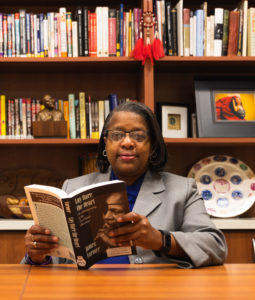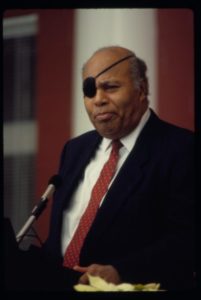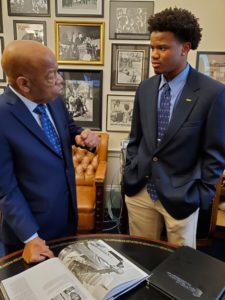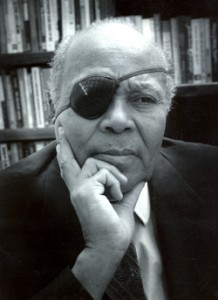Cultural Awareness Dining Events Make National News
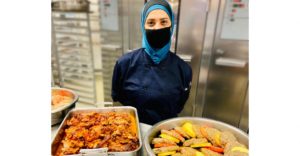
A recent Islamic Cultural Celebration Dinner was planned and executed by Jordanian pastry cook Hind Abulali and included Saudi Arabian Kabsa and Lebanese kafta made with Halal meats.
Food Management Magazine, a national publication, recently published a feature story about the cultural awareness dining events that have been co-sponsored by University Dining and the James Farmer Multicultural Center and student cultural groups, for over 10 years. Dr. Marion Sanford and the dining team have worked closely together to create special dining events that celebrate the many diverse cultures of our UMW students. We’re very proud to have been recognized by Food Management Magazine for wonderful partnership in promoting diversity and inclusion through our dining events. We hope you enjoy this article.
#UMWTogether – Social Connectedness/Community building
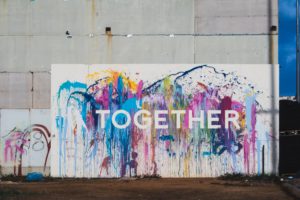 Social Connectivity
Social Connectivity
“Social connectivity is about coming together in creative ways to minimize the distance instead of only seeing the walls that separate us.”
https://time.com/collection/apart-not-alone/
What is a creative (socially distant) way you can increase your social connectedness?
Togetherness
“We are all in this together.” -Dr. Anthony Fauci
https://www.un.org/en/coronavirus/covid-19-photo-essay-we%E2%80%99re-all-together
#UMWTogether – Contributing to the community and looking out for each other, Be the change
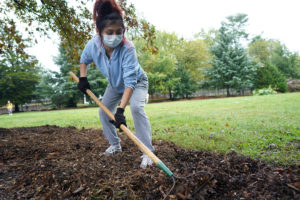
UMW student Yamila Merida spreads mulch for Tree Fredericksburg at Into the Streets last fall. Photo by Suzanne Carr Rossi.
“Civic engagement is very important. We all live here together and we need to look out for one another.” – Elizabeth Goreham
Why is it so important to find a cause you love and volunteer your time? Spending time enriching your community is a great way to broaden your perceptions of the world. By immersing yourself in a community and surrounding yourself with people who are dedicated to bettering the world, you can learn so much about how the world works. You gain a unique sense of purpose by serving those around you, one which often manifests in other areas of your life. Giving back to the place you call home helps to unite the community and bridge some of the social, economic and political gaps.
Volunteering: How helping others helps you
5 Benefits for giving back to the community
https://borgenproject.org/5-benefits-giving-back-community/
10 Ways You Can Make a Difference in Your Community
UMW’s Community Engagement webpage
https://academics.umw.edu/communityengagement/
………………………………………………………………………………………………………………………………………………………………..
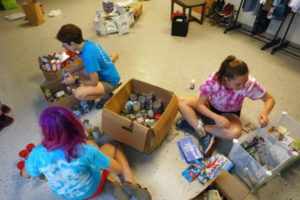
In fall 2019, prior to the pandemic, CCE’s Faculty Director Leslie Martin works with UMW first-years to stock the Eagle Resource Closet, a food pantry on the fifth floor of Lee Hall. Photo by Suzanne Rossi.
Historically, times of devastation have often proven that people, communities and, on a larger spectrum, the world has what it takes to work together for the greater good of humanity. For example, people from all over, domestically and abroad, came together to provide aid to the citizens of Louisiana, Texas, and adjacent regions that were tremendously impacted by the destruction of Hurricane Katrina in 2005. Or, what greater display of “representation matters” is there than the Olympics, where countries set aside differences in order to come together to celebrate one of the world’s greatest competitions. So, as we, in 2021, move deeper into the midst of a global pandemic and social unrest, it is hopeful that we all can agree that “working together” to recover society should be an avid part of our communal and personal action-plans this year. Therefore, let us all ponder the question “What steps can I take today, tomorrow, and in the near future to rebuild hope, stability, and peace within myself, my community, and the world?” And If you have feelings of questioning what impact “U” can have on the world, try to spell unity without it. You matter.
Here are some resources that may inspire you to keep striving to be the change:
https://www.washingtonpost.com/nation/2020/03/21/how-you-can-help-during-coronavirus/?arc404=true
https://earthjustice.org/blog/2020-april/8-ways-you-can-help-your-community-amid-the-covid-19-crisis
#UMWTogether – Collective and Individual Responsibility, Acts of Kindness
“It is our collective and individual responsibility to preserve and tend to the environment in which we all live.”
This is what Tenzin Gyatso, the 14th Dalai Lama (the spiritual leader of Tibetan Buddhism), has said about our obligations to the Earth and to each other. As you go through your day, how do you show gratitude to the planet, and to those who share it with you?
1) Purdue University has created a list of “45 Sustainability Resources You Need To Know”: https://www.purdueglobal.edu/blog/student-life/45-sustainability-resources/
2) The Dalai Lama talks about individuals’ environmental responsibility in 2015:
https://www.youtube.com/watch?v=vRwlygihP7I
“No act of kindness no matter how small is ever wasted.” Aesop, The Lion and the Mouse.
There are so many small acts of kindness that you can perform that have the power to make a significant, positive impact on another person’s life. When you engage in acts of kindness, it shows others that there is still kindness and empathy in the world. Often, a simple act of kindness on your part can inspire others to act in a more compassionate way, as well. Small acts of kindness that you can easily do include things like holding open the door for others, greeting individuals you encounter, and even just smiling at others. Acts of kindness also include treating yourself kindly, by doing things like taking breaks throughout the day and engaging in self-care. Amelia Earhart, the first woman to fly across the Atlantic, once said that “a single act of kindness throws out roots in all directions, and the roots spring up and make new trees.” By engaging in acts of kindness, no matter how simple, you are making the world a kinder and more compassionate place.
Here are some resources that may inspire you to engage in acts of kindness, both to other people and to yourself:
- https://www.youtube.com/watch?v=https://www.youtube.com/watch?v=_gJ5V525SCk_gJ5V525SCk
- https://diverseeducation.com/article/177240/?utm_campaign=DIV20MAY18D&utm_medium=email&utm_source=Eloqua
- https://weareiu.com/traditions-spirit/traditions/20-things-to-do-on-random-act-of-kindness-day/
- https://www.youtube.com/watch?v=BTQP7XzDxjI
James Farmer Multicultural Center Thanks #UMWRun4Justice Participants
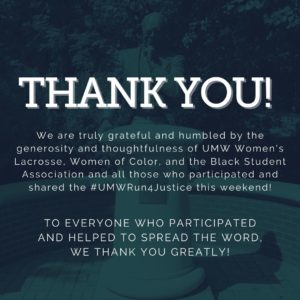 The James Farmer Multicultural Center thanks everyone who participated in the Virtual #UMWRun4Justice 5K this past weekend, especially UMW Women’s Lacrosse and Coach Maddie Taghon, Women of Color, and the Black Student Association, as well Alumni Relations for help with spreading the word. The event raised $2900 that will be used in support of the Black Lives Matter movement and other social justice initiatives at UMW. The desire is to create opportunities to help open conversations and develop a more inclusive campus. Please enjoy the video below of JFMC Director Marion Sanford thanking participants.
The James Farmer Multicultural Center thanks everyone who participated in the Virtual #UMWRun4Justice 5K this past weekend, especially UMW Women’s Lacrosse and Coach Maddie Taghon, Women of Color, and the Black Student Association, as well Alumni Relations for help with spreading the word. The event raised $2900 that will be used in support of the Black Lives Matter movement and other social justice initiatives at UMW. The desire is to create opportunities to help open conversations and develop a more inclusive campus. Please enjoy the video below of JFMC Director Marion Sanford thanking participants.
